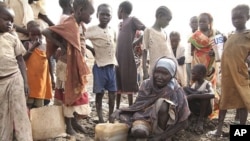More than 100,000 refugees have fled conflict in Sudan’s war-torn border states. Since June, just weeks before the country split, they sought refuge in the newly-independent south. But having escaped violence and aerial bombardment, the refugees now find themselves in another precarious situation, due to food and water shortages in South Sudan camps.
In Jamam, Upper Nile State, a dried up watering hole has now become a bowl of cracked, springy clay. Women submerged in small pits spend hours each day scooping up dirty water.
Women scooping up dirty water in Jamam, Upper Nile State - South Sudan (VOA Photo- H. McNeish)
Macda Doka Waka, 19, says her family fled here two months ago when the bombs fell on her village of Kukur, in Sudan’s Blue Nile state. Her husband is one of the rebel soldiers that President Omar al-Bashir has been fighting in Blue Nile since September, after violence spread in June from neighboring South Kordofan. Since then, no aid has been allowed into these states. Harvests have failed and routes largely have been cut off. These refugees are now relying on international charities in South Sudan for survival.
Kukur says she and her mother spend three hours at this watering hole, digging in the sludge to fill one jerry can with grayish water.
“We know that this water is not good," she admits, "but it is because we do not have water there. We used to make lines and take water from the tap, but since two days we have not had water and that is why all of us shifted here."
At bustling water points, squabbles and scuffles often break out between women, often waiting days in 45 C heat for water trucks to come and fill the lines of containers snaking along the cracked earth.
Women dig in the mud for dirty water, in Jamam, Upper Nile State - South Sudan(VOA Photo - H. McNeish)
A man with a whip and another with a pad and pen are in charge of trying to maintain order. But as the sun sets on Jamam, dejected women gather up their empty jerry cans and buckets. Tensions will only mount tomorrow.
Daudi Makamba, a water expert for the international charity OXFAM, says the organization is struggling to provide enough water for more than 35,000 people in the camp. Wells have collapsed and water-carrying trucks cannot keep up with demand.
“For the moment we have an average of five to six liters per person per day," explains Makamba. "For survival, it is from three liters up to seven liters. But for basic water needs, such as drinking, bathing and washing, we need at least to have from 7.5 to 15 liters per person per day.”
Sheikh Osman Alamin, 43, a farmer from Bau County, says he fled bomber planes in Blue Nile three months ago. He says life had become very difficult there because there is not even a market or anywhere to go and buy things to eat. If you can go and scavenge sorghum inside the houses of people who left, then fine he says -- but there is not even any salt. Sitting on a mat outside a makeshift shelter made of plastic sheeting, Alamin says that even now the refugees are not settled.
Within weeks, most of this floodplain site will be a mudbath, and complaints about the lack of food and water will increase as roads to this barren haven are also submerged.
OXFAM is appealing for help in trying to resolve supply problems now. It says it will be three times more expensive when the rains come and everything will have to be flown in and drilling boreholes will be even more difficult.
Alnoor Abudik Said, a Bau County chief, says he thinks President al-Bashir wants to rid Blue Nile of black people by bombing them. He adds that he doubts any peace will come soon enough to allow people back.










